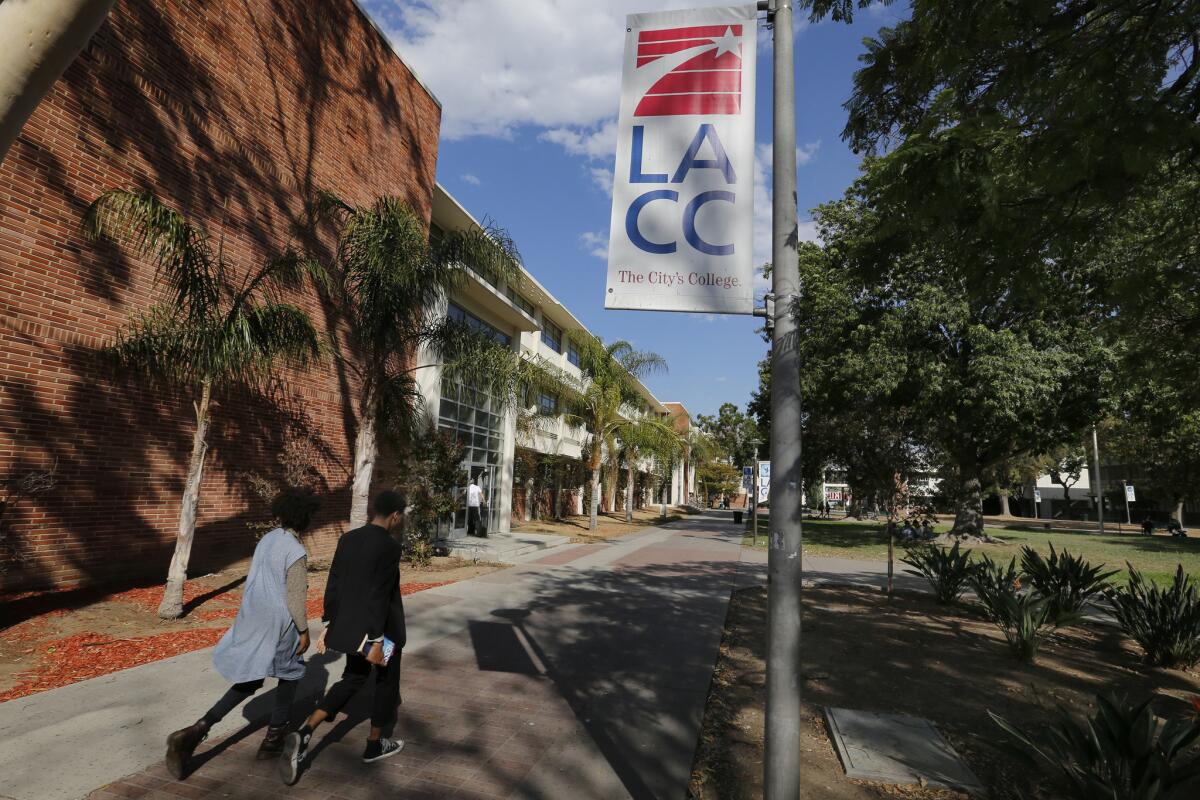Increased anxiety and depression top college students’ concerns in coronavirus survey

- Share via
Before the coronavirus outbreak shuttered colleges, Crystal Hammond worked three paid internships and did her homework on campus or at local coffee shops. School offered her the security and opportunity to focus on her future, she said.
Now, the second-year political science student at Los Angeles City College is worried about whether her internships will continue. She uses her mobile hot spot as a Wi-Fi source. She is overhearing more disturbing domestic disputes and arguments in her apartment building in the Westlake district west of downtown. All of the abrupt changes in her life and her community have hurt her mental health.
For the record:
3:26 p.m. March 31, 2020And earlier version of this story incorrectly said that students from 102 colleges responded to the survey. Students from 129 responded.
“I am very stressed out, I’m very anxious, and I want to get rid of it,” she said.
Hammond is one of more than 500 students who filled out a survey from Rise, a college affordability advocacy group, on the effects of the coronavirus outbreak. The survey found that 75% of college students who responded are dealing with higher levels of anxiety, depression and stress, and 52% have been laid off or had their work hours cut.
Rise did not conduct a scientific survey but sent the survey to its email list, posted it on social media and distributed it to the group’s campus organizers. From March 18 to March 24, 521 students attending 129 colleges responded, according to the group.
“It’s more personal for me,” Hammond said, referring to the cause of her stress. “Who’s gonna get sick first? Or who’s going to be affected first? My grandpa? My grandma?”
The Rise survey offers a snapshot of the rising anxieties among college students as schools close across the country.
In a UCLA Undergraduate Students Assn. Council survey filled out by more than 6,000 students, several said they’d been forced to move out of the dorms on short notice, were sad to be missing the last quarter of school and felt too stressed and concerned about world events to take finals, which would have happened last week.
Among those Rise surveyed, 6% said they have been forced to drop classes, 17% said they lacked safe and reliable housing, 20% said they lacked access to a mobile device or Wi-Fi, and 28% said they lacked access to healthy meals.
Only 21% said that their lives remained unchanged, other than classes being shifted online.
Max Lubin, the chief executive of Rise, said that while much of the focus has been on the health implications of the coronavirus, particularly for high-risk groups, college students are also in a moment of crisis. The organization said 25,000 students across the country are members.
“College student hunger and homelessness, and the evictions and dropouts that will result from these closures, can have just as devastating of an impact,” Lubin said. “It’s on all of us, and especially lawmakers and campus leaders, to make sure that the needs of their students are being met right now.”
Michelle Maghami, a Rise member and freshman at Pasadena City College who completed the survey, said that before the coronavirus outbreak she relied on the structure in her schedule to help keep her on track. Maghami, a human biology major who wants to be a dentist, said all of her internships have been put on hold. Her main source of income, running online shops, has also stalled.
“It’s easy to get depressed or feel like you’re not being productive,” she said. “You’re kind of shut down in a way. That’s the part I’ve been struggling the most with.”
For Hammond, the biggest relief from her increased anxiety and stress would be some clarity about how all of this will end.
“You’re calm when you know a level of certainty,” Hammond said. But “there’s nothing that’s guaranteed right now.”
More to Read
Sign up for Essential California
The most important California stories and recommendations in your inbox every morning.
You may occasionally receive promotional content from the Los Angeles Times.











